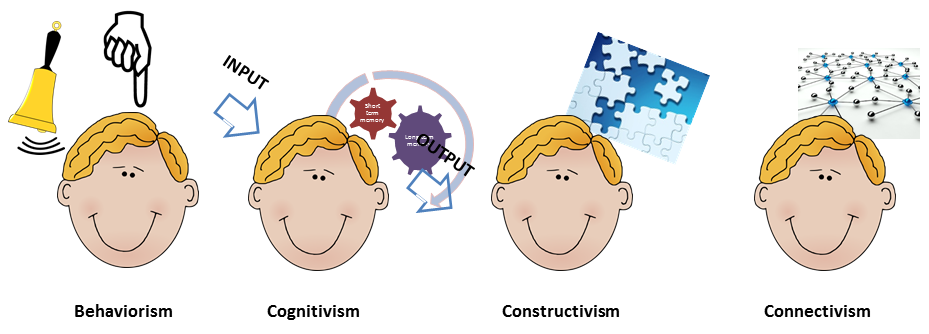Week 2: Overview
Section outline
A quick review of learning theories, instructional design approaches and related concepts/ideas to help ground each design plan.
Learning Theories - Review
Learning theories present ideas about the way that people learn; some theories derive from critical analysis, research and a significant body of evidence from testing in various educational situations. You may also notice that some widely accepted theories lack substantive research but are still valued by many experienced educators as they reflect some shared experiences with students and can still provide valuable guidance in developing courses.
Learning theories do not provide clearcut answers about the best ways to design learning for our increasingly complex and diverse society but exploring some of the philosophical foundations and critical elements of each major group of theories can be helpful in developing more flexible, varied approaches to education. You do not need to become an expert on learning theories to be a successful designer but an awareness of the theoretical foundation for many of the current course and curriculum designs can be helpful.
A simple way to organize your understanding of traditional and developing learning theories is to consider the four categories below: Behaviourism, Cognitivism, Constructivism and Connectivism. The titles reflect a shared focus and perspective on human learning and the nature of knowledge and reality.
Behaviourism includes theories that are based on changes in behaviour that can be directly observed and measured. Cognitivism includes theories that focus on the way the human brain take in information and stores it for recall and application. Constructivism includes a range of theories that begin from a subjective perception of reality and may include a belief that learning occurs through social interactions. A final theory (still argued by many) is Connectivism. This theory was developed to address the way learning has changed due to the exponential increase in information due to advances in digital technologies and connectivity. A central belief is that learning occurs primarily (most effectively?) through networked learning.

Some of the important questions you may ask about each are included in the table, followed by the names of some of the leading theorists.
| Behaviourism | Cognitivism | Constructivism | Connectivism | |
|---|---|---|---|---|
| How does learning occur? | stimulus -> response; observable behaviour main focus, chaining events | input -> process -> output (learning) structured, computational | meaning created by each learner (personal);focus on social learning | Distributed within a network, social, technologically enhanced, recognizing and interpreting patterns |
| What factors influence learning? | nature of stimulus (reward; punish), timing of events | existing schema, previous experiences | Engagement, participation, social, cultural | Diversity of network |
| What is the role of the memory | Repeated experiences are remembered - timing & type of reward / punishment are most influential | Encoding to long term memory, retrieval | Prior knowledge remixed to current context | Adaptive patterns, representative of current state, existing in networks |
| How does transfer occur? | Stimulus, response | Duplicating knowledge constructs of "knower" | Socialization | Connecting to (adding nodes) |
|
What types of learning are best explained by this theory? |
Task-based learning | Reasoning, clear objectives, problem solving | Social, vague ("ill defined") problem solving | Complex learning, rapid changing core, diverse knowledge sources |
|
Names of some theorists |
I. Pavlov, B.F. Skinner, J. Watson | D. Ausubel, J. Bruner, R. Gagne | J. Dewey, L. Vygotsky, E. von Glaserfeld | S. Downes & G. Siemens |
You may also enjoy exploring the amazingly comprehensive and interactive learning theories map, created by Richard Millwood for a European Union project: HoTEL (Holistic Approach to Technology Enhanced Learning).
References
(Note: many of the URLs below have expired. To find out more about any of the theorists listed below, follow the links in the bottom row of the table above.)
Fredholm, Lotta (2001) Ivan Petrovich Pavlov (1849-1936). Nobelprize.org. Retrieved from https://www.nobelprize.org/educational/medicine/pavlov/readmore.html
Greengrass, M. (2004) 100 Years of B.F. Skinner, American Psychological Association. Retrieved from http://www.apa.org/monitor/mar04/skinner.aspx
HLWiki Canada. (2016) John Dewey, Creative Commons BY-NC-SA, Retrieved from http://hlwiki.slais.ubc.ca/index.php/John_Dewey
HLWiki Canada. (2015) Gagne's Nine Events of Instruction, Creative Commons BY-NC-SA, Retrieved from http://hlwiki.slais.ubc.ca/index.php/Gagne's_Nine_Events_of_Instruction
HLWiki Canada. (2015) Lev Vygotsky, Creative Commons BY-NC-SA, Retrieved from http://hlwiki.slais.ubc.ca/index.php/Lev_Vygotsky
Siemens, George (2005) Connectivism: A Learning Theory for the Digital Age, International Journal of Instructional Technology and Distance Learning. Retrieved from http://www.itdl.org/journal/jan_05/article01.htm
Smith, M.K. (2002) ‘Jerome S. Bruner and the process of education’, the encyclopedia of informal education. [http://infed.org/mobi/jerome-bruner-and-the-process-of-education/ Retrieved: Dec. 10, 2016]
Smith, M. K. (2003). ‘Learning theory’, the encyclopedia of informal education. [http://infed.org/mobi/learning-theory-models-product-and-process/. Retrieved: Dec. 10, 2016].
Millwood, Richard. (2013) Learning Theory, v6, Holistic Approach to Technology Enhanced Learning (EU-funded project), retrieved from http://hotel-project.eu/sites/default/files/Learning_Theory_v6_web/Learning%20Theory.html
Scientific Reasoning Research Institute. von Glasersfeld, Ernst. Radical Constructivism. Retrieved from https://www.srri.umass.edu/vonglasersfeld/
Weibell, C. J. (2011). Principles of learning: 7 principles to guide personalized, student-centered learning in the technology-enhanced, blended learning environment. Retrieved Nov. 4, 2016 from [https://principlesoflearning.wordpress.com].
Wikipedia article - David Ausubel - Retrieved from https://en.wikipedia.org/wiki/David_Ausubel